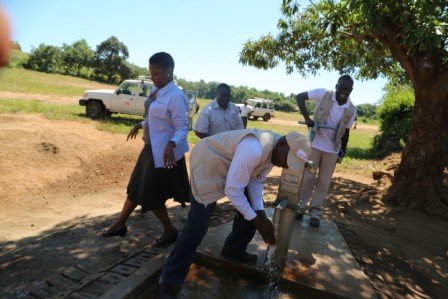
Leader of the Southern Africa Region (SAR) for World Vision Rudo Kwaramba—who was in Malawi—recently urged people in Kalira, Ntchisi—one of Malawi’s Central Region districts—to develop the spirit of ownership towards all water and Village Savings and Loans projects.
This, according to the SAR leader would ensure that children and the community benefit from such projects courtesy of World Vision Malawi through its Hong Kong support office.

Kwaramba said this when she led some board members, national and deputy director of World Vision Malawi to a tour of water and village savings and loans (VSL) in Kalira Area Programme (AP) in the district.
The visit to the site was aimed at appreciating the availability of water from a borehole drilled by World Vision in Group Village Head (GHV) Nyangu.
During the tour it was discovered that communities had no potable water and previously depended on an unprotected well for years.
“Children who used to be absent from school can now afford a bath. This was not the case because previously there was none and communities depended on a well,” said GVH Nyangu amid ululation from the communities.
“Children suffered from waterborne diseases like cholera. They were always late for school due to lack of. I used to get up as early as 4amto be the first, but that it was not as easy as possible,” recalls Juliana Tito, a mother of nine children.
Public health authorities agreed that lack of potable water forced children and adults to be under great sufferage of waterborne disease.
“As health officers, we used to register waterborne diseases such as diarrhea and cholera. To some extent malaria was also being reported,” said Edwin Mtemang’ombe, health surveillance assistant.
The borehole—which caters for the whole community—has relieved many children and women from the bondage of poor sanitation and hygiene, including increased school dropout rates.
After hearing from the stories, Kwaramba was at pains to imagine how difficult life was for children and women to having clean drinking water, good health and sanitation facilities.
“You mean, people were depending on this small well for water? No, I cannot believe this,” she said amid talks from the communities from that it was difficult to have access to the place during the rainy season.
With the borehole in place, Kwaramba urged people to take care of the facility by providing maximum security against vandals even at night.
“First, it is about behavioural change for those who have a tendency of vandalizing such properties. It is important to care for water and sanitation facilities and above all sensitise youths to wash hands before they eat and after visiting toilets.















Good news thks
a sense of ownership breeds sustainable development. thus, there is need to take heed of this invaluable piece of advice generously offered by World Vision